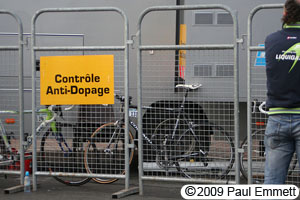 This week saw the biggest name yet being excluded because of the biological passport, with Franco Pellizotti losing the chance to compete in the Giro and improve on his podium place of 2009.
This week saw the biggest name yet being excluded because of the biological passport, with Franco Pellizotti losing the chance to compete in the Giro and improve on his podium place of 2009.
According to the UCI’s independent experts who assess the bio passport results, Pellizotti (Liquigas-Doimo), Jesús Rosendo Prado (Andalucía-Cajasur) and Tadej Valjavec (Ag2r-La Mondiale) all showed clear signs of doping and their federations have been requested to begin disciplinary proceedings.
The UCI’s anti-doping manager Francesca Rossi has said that more cases can be expected, but that no timeframe would be given.
“We will have new cases but I can’t say to you the timing. You never know when,” she said in an interview with The Associated Press. “We are continuously testing (riders) and involving our experts. When, statistically, the case is solid we can proceed.”
Prior to Monday’s announcement about Pellizotti, Rosendo Prado and Valjavec, it had been reported that between five and eight riders would be named. Media reports then suggested that two Italians, two Spaniards, a Russian and a Slovenian were those in question.
The three named were Italian, Spanish and Slovenian, respectively. If the original indications were indeed correct, that would leave an Italian, a Spaniard and a Russian as those likely to be next on the list.
Rossi confirmed that the UCI would finally introduce a steroid profiling element to the biological passport, thus tracing fluctuations in hormones such as testosterone. That has long been pinpointed as an important addition to the longitudinal profiling of riders, and one which would make it harder to cheat.
She also said that as the passport and the analysis process continues to develop, things will become quicker.
“It’s the beginning of the story,” Rossi stated. “I am sure that in time the procedure is improving and we are going to be faster when we have a case.”
In separate news, this year’s Giro d’Italia will feature 520 anti-doping tests, approximately 40 more than in 2009. 340 of these will be blood samples with 141 urine screens also being conducted, according to Feltet.dk.
The samples will be analysed in laboratories located in Rome, Lausanne, Paris and Cologne.